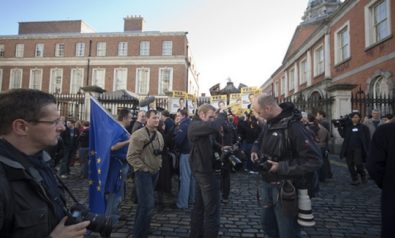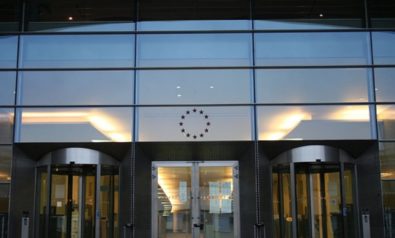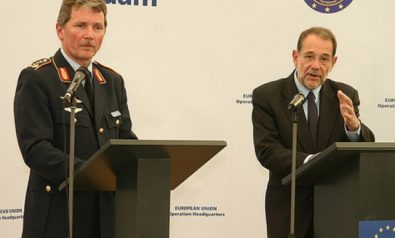Critical analysis of the Common Foreign and Security Policy and its implementation since its enhancement with the Treaty of Lisbon in 2009.
With the ratification of the Treaty of Lisbon in November 2009, the European Union (EU) was given the tools to create a coherent foreign policy. At last, Kissinger’s oft-cited question of “Who do I call when I want to speak with Europe” would be answered. This was the assumption in the days and months following ratification, at least. However, as we near the two year anniversary of Lisbon, few would claim that European diplomacy has lived up to the treaty’s potential.
Certainly, Lisbon provided the EU with important innovations in the area of a common foreign policy. Special note must be given to the creation of a European diplomatic service, the European External Action Service (EEAS). This corps of EU diplomats is tasked with assisting another major foreign policy innovation, the High Representative of the Union for Foreign Affairs and Security Policy (HR). The HR was envisioned, by proponents at least, as a “foreign minister" for the EU, intended to ensure consistency in policies emanating from both the supranational Commission and the nationally manned Council. Thus, the High Representative was double-hatted, as both Vice President of the Commission and chair of the Foreign Affairs Council.
Of course, the EU’s post-Lisbon external relations are still in their infancy. It is difficult to catch a glimpse of what the future will bring for European diplomacy at a time when the Common Security and Foreign Policy (CFSP) is in a developmental stage. This is particularly evident since the eurozone crisis during which the CFSP has been relegated to a distant second place. But regardless of current circumstances, indications of the CFSP lacking whole-hearted support from Europe’s capitals are not hard to find.
Take, for example, Europe’s difficulty in developing a coherent stance on the issue of Palestinian statehood. While some, such as Germany, Italy, and the Czech Republic, opposed recognition, others, such as Spain, Sweden, and Finland took a pro-Palestine stance. Another telling aspect is Sarkozy taking the lead on this issue, arguably bypassing HR Catherine Ashton, and becoming the central spokesman for an “intermediate stage” during which Palestine would be admitted to the United Nations (UN) as an observer. Although Sarkozy and Ashton’s positions are synched, the French President seems to be in the driving seat on the matter. Meanwhile, some member states refuse to take a clear position, and others, such as the Netherlands, oppose the upgrade of the Palestinian UN status. Needless to say, the failure to present a common stance damages the credibility of the EU in general, and makes the EU’s constructive participation in Middle East Quartet (US, Russia, the UN, and the EU)all the more difficult.
The lack of common ground is particularly damaging to the implementation of the CFSP, as most CFSP matters have been carefully excluded from the normal EU decision making procedure, the so-called “Community Method”. Using this procedure, decisions are made by qualified majority in the Council in cooperation with the European Parliament. In short, this method allows for a decision, even in cases where there is not unanimity among member states.
The exclusion of CFSP matters from the Community Method naturally alludes to the reluctance of member states to give up their autonomy in foreign policy – in particular in security and defense policy areas. Take for example the defense and military component of the CFSP, the Common Security and Defense Policy mission (CSDP), mission in Afghanistan.
To begin with, any ambitions of an EU military presence in Afghanistan were swiftly quashed. If there were any doubts regarding Europe’s security arrangements, it was made clear by Atlanticist member states that NATO (North Atlantic Treaty Organization) was the appropriate institution for this type of combat activity. Instead, the CSDP mission in Afghanistan, European Union Police mission in Afghanistan (EUPOL), focused on reform of civil society (as opposed to the combat units trained by the US), for example by training a police force and a judiciary. Even so, member states have only contributed 300 personnel to the EUPOL mission. Furthermore, in spite of the Lisbon treaty doing away with the EU’s three-pillar structure, internal coordination is not what it should be. For example, EUPOL – funded by a distinct CSDP budget – cannot utilize Commission funds earmarked for the improvement of the Afghan National Police (ANP).
In spite of many shortcomings, it is important to remember that enhancements in a common foreign policy have, after all, materialized in specific policy areas. More specifically, the “soft” policy areas, such as development, trade, and climate, have been granted a higher level of supranational decision making by the EU. Conversely, however, the careful selection of specific policy areas, where member states pool their political capital, can also simply highlight the exclusion of areas where they do not.
Optimists also point out that the EU has successfully strengthened its representation in various international forums. For example, the EU now enjoys enhanced observer status at the UN. Although it cannot vote, the EU now has the right to address the General Assembly, make proposals, submit amendments, and circulate documents. Nevertheless, although the EU’s profile has been strengthened in these areas, the EU’s international representation is dependent upon agreements adopted in the EU, and of course on the acceptance of EU representation by a given international forum. This leaves plenty of room for member states to pick-and-choose between EU or national representation (or both), and demonstrates that EU diplomacy is viewed as supportive of national diplomacy by Europe’s leaders.
If a recent speech by Britain’s foreign secretary, William Hague, is indicative of where Europe’s foreign policy is heading, the future of European diplomacy does not look Brussels-centric. “We cannot outsource parts of our foreign policy, for example to the European External Action Service as some have suggested… along with other European countries’ foreign ministries is crucial to our ability to project collective influence. There is not and will never be any substitute for a strong British diplomatic service that advances the interests of the United Kingdom”, Hague is reported to have said by The Guardian in its article “UK will not ‘outsource’ foreign policy”.
In conclusion, it would seem that the important innovations in the Treaty of Lisbon are contingent upon the will of the member states to implement the treaty to its full extent. As things stand now, the European public seems overwhelmingly opposed to more EU activity. With the eurocrisis raging, the public views the EU as either dishing out austerity measures or bailouts, none of which are popular. Naturally, European leaders will take this to heart and tread carefully when it comes to expanding European integration to new areas.
Of course things could change. The eurocrisis could abate and the EU could again be perceived as a vehicle of European prosperity. This could give room for further integration in the realm of foreign policy. Other structural changes, such as the downgrading of the US’ hyper power status, could arguably prompt the EU to take a more pro-CFSP stance. Diminished US power, although not to be exaggerated, could make a strong EU foreign policy more attractive for otherwise pro–Atlantic countries. As rising powers demand representation in international organizations, or simply choose to make their power felt in a de facto fashion, Europe will feel the pressure of being increasingly irrelevant. This could, out of necessity, lead Europe to opt for a pooling of diplomatic weight.
One thing seems obvious; the neglect of the innovations introduced by the Lisbon Treaty will lead Europe down the path of irrelevance. Coherence in the EU’s foreign policy is the only way in which the EU will be taken seriously as a global actor, and the only way with which European interests and values can be effectively promoted. The tools to develop policy coherence already exist. They must now be utilized.
Support Fair Observer
We rely on your support for our independence, diversity and quality.
For more than 10 years, Fair Observer has been free, fair and independent. No billionaire owns us, no advertisers control us. We are a reader-supported nonprofit. Unlike many other publications, we keep our content free for readers regardless of where they live or whether they can afford to pay. We have no paywalls and no ads.
In the post-truth era of fake news, echo chambers and filter bubbles, we publish a plurality of perspectives from around the world. Anyone can publish with us, but everyone goes through a rigorous editorial process. So, you get fact-checked, well-reasoned content instead of noise.
We publish 2,500+ voices from 90+ countries. We also conduct education and training programs
on subjects ranging from digital media and journalism to writing and critical thinking. This
doesn’t come cheap. Servers, editors, trainers and web developers cost
money.
Please consider supporting us on a regular basis as a recurring donor or a
sustaining member.
Will you support FO’s journalism?
We rely on your support for our independence, diversity and quality.












Comment